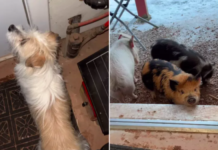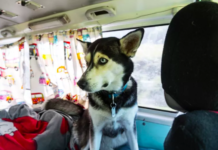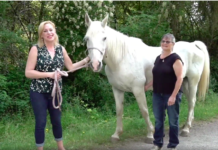Last Updated on January 13, 2024 by Fumipets
Because of their peculiar vocalization style, Basenjis, who were first domesticated in ancient Africa, are often referred to as “barkless dogs.” Despite being the smallest of the hound breeds, basenji dogs are not to be underestimated. Behind their adorable appearances, this breed has a lot of activity and originality.
Because of their distinctive grooming practices and their independent, somewhat difficult nature, Basenjis are frequently referred to as “cat-like.” Like cats, Basenjis also like climbing to the highest point they can, even if it means going over the fence that’s supposed to keep them in. Check the height of your backyard fence and continue reading to discover all you need to know before purchasing or adopting a Basenji if you believe this breed would be the right fit for you.
| Height: | 16-17 inches |
| Weight: | 22-24 pounds |
| Lifespan: | 13-14 years |
| Colors: | Black and white, black and tan and white, red and white, brindle and white |
| Suitable for: | Active individuals or families looking for a clever, independent, energetic breed who neither sheds nor barks |
| Temperament: | Independent, smart, poised, mischievous, aloof, “cat-like” |
How Much Do Basenji Puppies Cost?
When bought from a breeder, basenji pups normally cost between $1,200 and $1,800. Avoid buying from puppy mills or pet stores and take care to find ethical breeders. Breeders that are ethical will ensure that the parents of the puppy are healthy and free from genetic illnesses. They will also make sure that their pups have the proper vaccinations and dewormers, as well as a vet exam.
To find a reputable breeder, ask your veterinarian or other Basenji owners in your area. Both the Basenji Club of America and the American Kennel Club (AKC) maintain listings of reliable breeders.
Animal shelters or Basenji rescue organizations sometimes have adoptable Basenjis available if you choose to adopt rather than purchase. Depending on where you are adopting from, adoption costs may vary, but they will almost certainly be far less than the price of Basenji dogs.

3 Little-Known Facts About Basenji dogs
1. Basenjis Don’t Usually Bark, But They Aren’t Silent Either
The “barkless dog” moniker applies to the Basenji. They can physically bark, although they don’t usually do it. However, while being mostly quiet, these dogs sometimes make a yodeling sound. Although it is said that Basenjis were deliberately bred not to bark, the real cause of this peculiar behavior is still unknown.
2. Basenjis Are Big Believers in Proper Hygiene
Basenjis practice strict and exact grooming routines. Like cats, they regularly groom themselves from head to toe. The lack of a strong “doggy” smell is another characteristic that makes basenjis popular with many people.
3. They Are One of The Oldest Known Dog Breeds
The Pharaohs of ancient Egypt received the first Basenjis as presents. Artwork from ancient Egypt and other early cultures has been found that depicts basenji dogs.
Temperament & Intelligence of the Basenji
Basenji dogs are often energetic and inquisitive. While they might be distrustful and standoffish with outsiders, they are loving among their own people. Due to their propensity for being too protective, Basenjis must be socialized from an early age.
Basenjis are a smart breed, perhaps more so than is necessary. Basenjis like being active, and if they start to become bored, they will look for ways to pass the time by getting into trouble often. Despite their intelligence, Basenji dogs may be difficult to teach since they are unyielding and often grow bored. When teaching this breed, patience, ingenuity, and a lot of positive reinforcement are required.
Are These Dogs Good for Families? 
Due to their high levels of activity, basenjis are a suitable breed for families that lead busy lifestyles. Basenjis get along nicely with kids when they are properly socialized. Children should be trained to handle Basenjis softly but forcefully since they prefer to be in control and don’t tolerate hard treatment. When playing with small children, very spirited Basenjis may occasionally play too boisterously and should be well watched.
One other thing to keep in mind is that Basenjis are renowned chewers, particularly in households with young children. Children who don’t always tidy up after themselves can realize that the new pet’s inquisitive fangs are now endangering their toys. However, parents could find the added motivation to encourage their children to assist maintain the living environment tidy to be welcome.
Does This Breed Get Along with Other Pets?
Although early socialization is important, basenji dogs often get along with other dogs since they were raised to hunt in packs. Basenjis do have a strong prey drive as hunters. They can be trained to coexist with cats, particularly if they are socialized early enough, but care should be used. Basenjis should be kept far from smaller animals like rats and birds since they are unreliable with them.

Things to Know When Owning a Basenji:
Are you beginning to wonder whether your way of life and character might work well with a Basenji? To assist you in making an educated choice, below is some information about how to properly feed and care for a Basenji.
Food & Diet Requirements 
Basenjis should be given premium dog chow, either homemade or professionally produced. To ensure that homemade feeds are nutritionally balanced, a veterinarian’s advice should always be sought before making any changes. Regardless of the food you choose, be careful to provide the right formulation for the Basenji’s life stage, whether it is a puppy, adult, or senior. Because basenji dogs are prone to obesity, keep an eye on their weight and refrain from giving them too many goodies. Table scraps should not be fed to Basenjis since they might upset their stomachs and be harmful.
Exercise 
Basenjis are a high-energy breed, as was previously said, thus they need regular exercise to be healthy and engaged. For your Basenji’s greatest health, aim for at least 40 minutes of daily strenuous play, walking, or running. Basenjis should not be left off-leash without a fence due to their strong hunting instincts since they may flee in search of some unfortunate victim. Numerous dog activities are popular among basenjis, but lure coursing stands out because it makes use of their inherent hunting instincts.
Training 
Although they are bright, basenji dogs may be challenging to teach since they are often unyielding and easily become bored. Due to their intelligence, a Basenji may pick up a new ability quickly, but whether they will consistently obey their handler is another matter. The best training methods for Basenjis are patience and positive reinforcement. Make in mind that Basenjis often lack patience for lengthy training sessions, so it’s best to keep them brief and rewarding.
Grooming 
Like cats, Basenjis are self-aware and will maintain their cleanliness without much assistance from you. They don’t typically need to take frequent baths since they don’t have an undercoat and don’t smell. The Basenji’s coat may be kept in good condition with a little brushing with a hound glove or a soft bristle brush. Like any dogs, Basenjis need to have their nails cut short and have their teeth washed often.
Health and Conditions 
Basenjis are a generally healthy breed. They should have a cautious eye kept on their food and weight since, as was already indicated, they are prone to obesity. Breeders that are conscientious will check their dogs for genetic illnesses and only breed the healthiest individuals. Before acquiring a puppy, inquire with your breeder about the health certification and examination of the parents.
https://www.youtube.com/watch?v=uG3EHbVWfxk
Minor Conditions
• Hypothyroidism
Hypothyroidism, or insufficient thyroid hormone production, is a less serious medical disease that certain Basenjis experience. Many breeds of dogs have hypothyroidism, but Basenjis may have a hereditary form of autoimmune thyroiditis. Breeding dogs should be tested for this genetic condition and should not be allowed to reproduce if they are.
Serious Conditions
Fanconi disease, progressive retinal atrophy, and hip dysplasia are three major genetic health issues that Basenjis may face.
• Progressive retinal atrophy
A disorder known as Progressive Retinal Atrophy (PRA) damages the eyesight of Basenjis and may ultimately result in total blindness. Due to the late onset of PRA, a puppy’s eyes may first seem to be completely normal before they start to lose their eyesight.
• Fanconi syndrome
When the kidneys have Fanconi syndrome, the body’s ability to reabsorb nutrients and water is compromised. Instead, the body excretes the nutrients by dumping them back into the urine. The afflicted Basenji will eventually get malnourished, which may lead to poor physical condition or perhaps death.
• Hip dysplasia
Hip dysplasia, a disease where the hip socket does not completely cover the ball of the upper leg bone, affects a tiny number of Basenjis. Hip dysplasia may be painful and have a negative impact on quality of life, while not being fatal. In order to avoid passing on this disease to offspring, meticulous breeders will have their dogs’ hips examined before breeding.
Before breeding their dogs, reputable breeders will do genetic testing for these hereditary disorders. Verify with your breeder that the parents of your dog have undergone screening and are healthy.

Male vs Female
Male or female dogs are preferred by certain dog owners. But are there any distinctions between the two that can help you decide whether you’d prefer a male or female Basenji?
Generally speaking, female Basenjis are a tad smaller than male Basenjis. There usually isn’t much of a difference between male and female Basenjis save size. They often have comparable temperaments and levels of energy.
What pups are available as well as simple personal choice may influence whether to get a male or female Basenji.
Final Thoughts
As we’ve seen, Basenjis are a rare breed with a unique mix of lovable and difficult character qualities. To ensure they are ready to provide their new pet a happy, active life, prospective Basenji owners should get acquainted with these characteristics. Basenjis may provide many hours of fun and friendship if accepted into the proper household and allowed to live with the family. A lot of Basenji owners ultimately decide that one Basenji is just not enough!


















